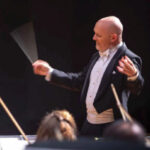
The concert hall is eerily silent as Irish conductor Peter Shannon raises the baton, a silent signal to the orchestra to be ready. The posture is a familiar one to Shannon, who has conducted orchestras in Europe and the US since he began his music career more than two decades ago.
It’s a career that now brings Shannon from Cork, Ireland, to Stanford’s Center for Compassion and Altruism Research and Education (CCARE). Born a musician into a family of doctors, Shannon has always had a desire to connect music and medicine with an instinctive belief that music’s power to move people is deeply linked to healing.
Shannon began by bringing his musicians into the chemotherapy ward, where they would play for patients on some of their darkest days. That quickly grew into a deeper experience, and he went on to lead programs at hospitals, cancer institutes and hospice settings. “I realized quickly that something special was happening, especially when people got to choose their own pieces of music for us to play,” Shannon said. “Having control can be enormously beneficial for a patient, and the self-soothing that occurs when the patient chooses a piece of music that is special to them should not be underrated.”
He recalls the 80-year-old man who requested his musicians to play “Porgy and Bess,” watching his face as he was transported back to New York a certain day 50 years before, and memories of his late wife. Or the cancer patient in her 40s who requested “Moana” because it reminded her of going to the movie with her three children the week previous. Shannon has hundreds of such stories. It also became clear to him that the benefits stretched far beyond the patients and their family members to the doctors, nurses, and to the musicians themselves. Shannon realized then that the act of playing music was itself an act of compassion.
These observations led Shannon to study the science behind music’s connection to compassion and healing, and in particular the mind-body connection. Shannon discovered the work of Paul Gilbert, an English psychologist who developed a psychotherapeutic model called Compassion Focused Therapy (CFT). The central technique of CFT is compassionate mind training, and it was through Gilbert’s work that Shannon became familiar with CCARE and Dr. James Doty, its founder. Doty’s work as a neurosurgeon who recognized the importance of compassion in all facets of life resounded deeply with Shannon. When he reached out to Dr. Doty and explained about his own work, Dr. Doty invited Shannon as a visiting instructor at CCARE Stanford.
It was as conductor of the Savannah Philharmonic, in Georgia, that Shannon met Dr. Jacqueline Huntly, a physician with an equal passion in integrative medicine. Together they founded The American Institute of Music and Healing (AIMH) and developed several powerful workshops, including a curriculum that introduces physicians and medical students to music as a modality for compassionate connection with themselves and with patients. After carrying out these workshops, in 2022 Shannon was appointed Affiliate Professor of Bioethics and Medical Humanities at Mercer University School of Medicine, USA.
In the area of the Health Humanities, both Shannon and Huntly use music as a modality to explore similarities between the relationship of conductors to their musicians and that of physicians and their patients. Both shoulder a profound responsibility to treat those in their care with compassion and respect, and to nurture a genuine connection with them.
Currently conductor of The Jackson Symphony, Tennessee, Shannon is also active as a guest conductor in Europe. Outside the concert hall, he is an Irish Research Council grant recipient and in the final year of his PhD in musicology at Maynooth University, Ireland. His dissertation centers around Franz Schubert and Mindbody medicine. Schubert’s eighth symphony was never completed (hence the nickname ‘Unfinished’) and was written when the composer was ill from syphilis. By contrast, his ninth Symphony, which the composer wrote while he was healthy, in remission from syphilis, is hugely positive and the longest of the symphonies.
Shannon began his musical education as a choirboy in Cork Cathedral. He’s since earned a Bachelor of Music from University College Dublin, followed by postgraduate degrees in Weimar at the Franz Liszt Hochschule für Musik, founded by the pianist Franz Liszt, and from Karlsruhe Hochschule für Musik. At age 26 Shannon was appointed conductor of the Collegium Musicum Orchestra at the University of Heidelberg, Germany, founded in 1386.
